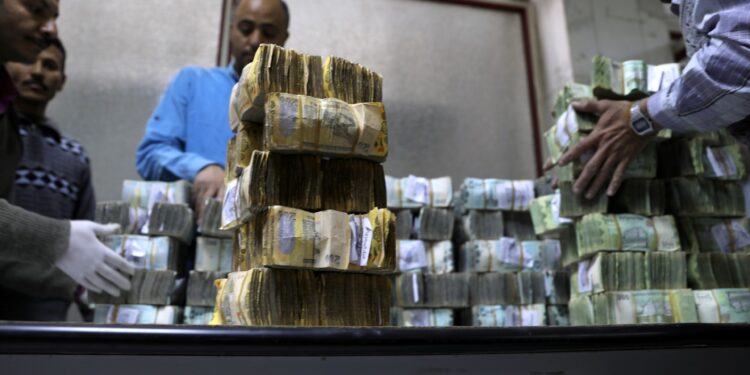Three sources in the internationally recognized Yemeni government said that the government is currently facing an unprecedented stifling financial crisis, which has caused a delay in disbursing employee salaries for two months and an inability to provide fuel for power generation plants.
The sources reported that the government is facing pressure that has caused the price of the local currency to decline against the dollar to its lowest level in the country’s history, which is 2040 riyals per dollar.
A senior official at the Central Bank of Yemen in Aden told Reuters on Saturday, requesting that his name not be mentioned, that the government is suffering amid a decline in state revenues to their lowest levels ever.
In mid-June, Saudi Arabia deposited about $300 million in the accounts of the Central Bank of Yemen, which is based in Aden, southern Yemen, as the third installment of the one-year grant of $1.2 billion to support the general budget, which began in August last year.
The official confirmed that the crisis limited the government’s ability to provide fuel to power plants in the city of Aden and its neighboring governorates.
Residents said that the number of hours of power outage in Aden and the southern governorates rose to 16 hours per day.
The official pointed out, “A deficit in the balance of payments that reached its peak due to the acute shortage of government resources and the increased demand for foreign currency to cover the import bill.”
Yemen obtains 95% of most of its food needs from external sources.
The situation has deteriorated in Aden, the seat of the government, and southern Yemen in particular since, in late 2022, several Houthi drone attacks targeted oil tankers at southern oil terminals, preventing the government from exporting crude oil and fuel flows from there.
Monetary division
In addition to the political and military division, Yemen is witnessing a monetary division, as there are two central banks, one of which is run by the government in the city of Aden in the south of the country and deals in modern securities, the value of the US dollar in which has reached 2040 riyals, and the other in the capital, Sanaa, is managed by the Houthis, and deals in older, valuable securities. The US dollar has 531 riyals.
Last June, the Central Bank in Aden stopped dealing with 6 of the largest commercial banks operating in Houthi-controlled areas, after they refused to move their headquarters to Aden. The Central Bank in Sanaa responded by stopping dealing with 12 banks operating in areas under government influence.
The Central Bank in Aden is recognized by international financial institutions, which gives it the ability to control access to the global financial network “SWIFT,” and it is also the only body through which local commercial banks can finance import operations from abroad.
On the other hand, the Central Bank in Sanaa derives its strength from the presence of the main bank headquarters in its areas of influence, which gives it the ability to control financial and banking activities inside Yemen. It previously prevented local commercial banks from sharing their data with the Central Bank in Aden.



